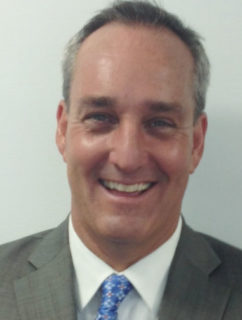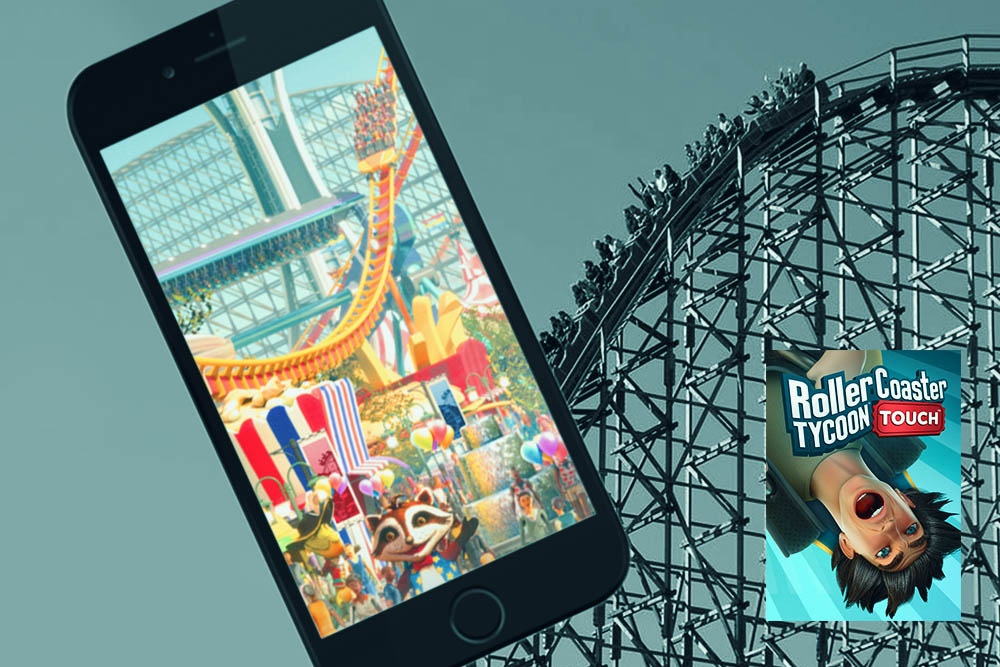Keep your hands and arms inside the ride at all times, because Atari has announced a three-year license extension for Chris Sawyer’s hit franchise, RollerCoaster Tycoon (RCT). The extension comes on the heels of the recent success of two mobile games, RollerCoaster Tycoon Classic and RollerCoaster Tycoon Touch and during an exciting time for the legacy brand in gaming and beyond.
Atari COO Todd Shallbetter joined AListDaily to discuss what’s to come for the famous theme-park-building sim, the potential for virtual reality, marketing across platforms and even Blade Runner in this exclusive interview.

RollerCoaster Tycoon has been a hit for nearly two decades now. How has the relationship between franchise creator Chris Sawyer and Atari evolved over the years?
I think the longevity of the relationship is kind of a testament to the relationship itself. We have nothing but the utmost respect for Chris and his vision. He is certainly the visionary who created this expansive concept of a roller coaster and theme park simulation. It’s such a deep, deep genre of games that’s very difficult to conceive, ideate and deliver on. We respect Chris’ judgment and opinions on things, so we try to work with him whenever he’s willing to work with us.
What would you say is the biggest reason for RollerCoaster Tycoon‘s success?
I think it’s the appeal of a deep simulation about something fun. It really comes down to [the fact that] everyone loves amusement parks, thrill rides and roller coasters. You take that obvious enjoyment that millions of people enjoy annually with their friends or by themselves and couple it with a very deep simulation—the ability for gamers to really get into depth and think about not only what people see upfront in theme parks and the experience of riding these rides, but behind the scenes [and] all the business statistics. All the different things that you can do to affect the outcome of your game. It’s fun but it’s also a deep, intellectual exercise.
How did Atari adapt RollerCoaster Tycoon‘s marketing for the mobile demographic?
We have been building mobile games for a good number of years. It really is marketing to gamers still and again, while the techniques are a little different because user acquisition is a much more analytical proposition than say, selling games on store shelves and even digitally. Mobile is a very interesting beast in and of itself because user acquisition becomes the name of the game. I think how we’ve adapted is by learning and becoming subject matter experts in user acquisition. We’ve also leveraged partnerships with those people who have amazing competencies in user acquisition and mobile marketing. We do a lot of it in-house, but we also work with a couple of great agencies that really help us get directly to consumers—acquiring them and then marketing to them.
It’s a couple stage process. We have to acquire the users, get them playing the game, and then they’ll hopefully buy things in-game or watch ads to be rewarded for it. I think that we’ve educated ourselves and become quite proficient in marketing and we allocate proper budgets. We’re really a data-driven entity, even more so now with mobile. We really value user data and user analytics in general. It’s kind of a natural extension to use this data in the mobile space because it’s something we do well and it’s perfectly applicable to mobile.
What does this license extension mean for Atari and the fans?
It shows fans and the community that Atari continues to be committed to the franchise. We’re going to continue to invest in the franchise and in the existing games, for certain. I can’t speak for everything going through the license because we’re still working through quite a bit of that, [however] we’re incredibly dedicated—both from a company perspective and individuals who work here—in supporting [Atari’s] products in the marketplace today, continuing to add content and continuing to build out these experiences.
That’s what we really hope fans see—they know we’re committed to this franchise and to delivering the best possible experiences and fun experiences that we can. Now we have this extra time, which is going to allow us to continue that pattern of investing and working with the [RollerCoaster Tycoon] IPs to make them bigger and better.
Any plans for a VR experience?
I can say this: I think it would be worth watching to see if we can bring a really exciting roller coaster VR experience to fans. I think stranger things have happened [laughs]. It’s a difficult position right now as everyone is trying to find their sea legs with VR, but it’s a very interesting time to be in it. Do we move forward with it knowing what our install bases are, or do we just sit on the sidelines and watch other people perfect the development process rather than us diving in with both feet and just flailing away at it?
We’re watching the marketplace and we’re treading very lightly in virtual reality right now. We haven’t, to date, made any huge commitments to VR. That being said, we are working with it. We have VR dev kits in our offices and we are playing around with stuff. It would be a very interesting and fun proposition if we could bring a VR RollerCoaster Tycoon experience.
Atari’s logo was prominently featured in the new trailer for Blade Runner 2049. Is this an official partnership for the film, or just a prediction that Atari will still be huge in the future?
It’s a very astute prediction. We think we’ll be around—we’ve been around for about 45 years so far, we were pioneers in the world of gaming, and we’re still continuing to deliver exciting things. We have multiple business verticals outside of games—we’re still working as the big lifestyle brand, we have an IoT division that’s starting out with connected devices, we’re doing film, television, online gambling, we have our very robust licensing business . . . so, we definitely should be around for years and years to come.
We think this brand is so beloved—we love it, that’s why we’re here and a number of us have stayed for over a decade to continue to shepherd the brand along. [The Atari logo] is a mention based on the original [Blade Runner] movie—Atari was mentioned in the original, so they contacted us and we gave them permission to use the logo and any artwork in the film. I can’t say that it signifies a broader partnership than that at this time, but we’re just very pleased to be included and we were super delighted to see ourselves in the trailer. We’re all science fiction, geeky fans around here so we love seeing that.
What advice would you give marketers working across multiple platforms?
My recommendation for transmedia marketing is to stand by your brand, focus on your brand’s messages and keep your core messaging consistent. If you’re building out a brand and translating it across multiple media channels, don’t be afraid to enlist specialists who are experts in their given vertical. I think that’s very important. You don’t want to hire a billboard company to do your online user acquisition and vice versa.
You can never underestimate the value of quality created assets. Never undercut that because you can never have enough quality art assets, animated assets, short trailers . . . video assets perform particularly well. Never underestimate the amount you need to spend to market. It’s not a simple task and it needs sustained, committed investment. Especially for transmedia or trans-platform marketing, [social media] touches all your users at different levels. There are certain social media tools you can use to be very, very specific in your targeting. Don’t be afraid to hire and work with experts, don’t be afraid to use social media to its fullest and commit yourself to the brand.
We have done some work with influencers and will continue to do so. I think we’ve done some great work with influencers and are very particular about how and who we partner with because it has to be just the right fit.

